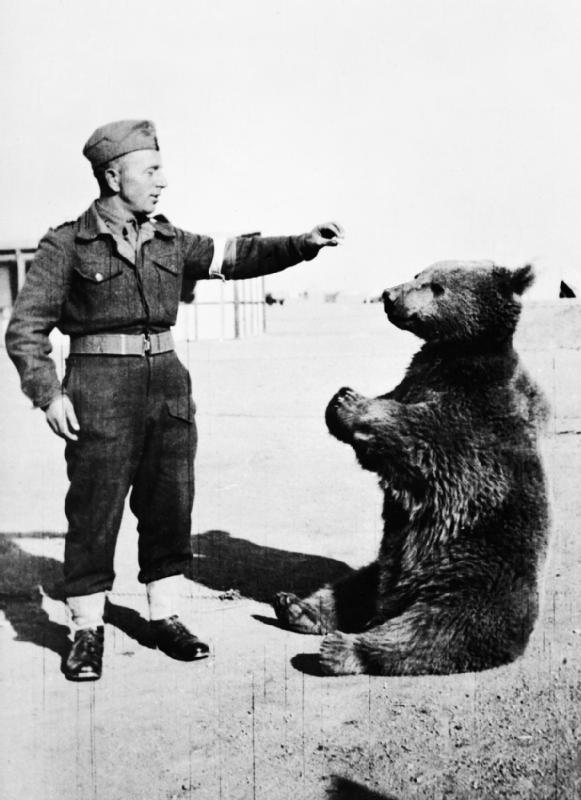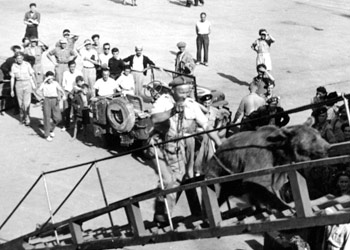Wojtek the Soldier Bear
 ThTe story of Wojtek the bear is perhaps unique, because Wojtek was a volunteer in the Polish Army; he was indeed the one and only four-legged “soldier” in our forces – the mascot of the 22nd Transport Company…
ThTe story of Wojtek the bear is perhaps unique, because Wojtek was a volunteer in the Polish Army; he was indeed the one and only four-legged “soldier” in our forces – the mascot of the 22nd Transport Company…
Wojtek started his career as a young cub, cuddly and adventurous, taken care of by soldiers of the newly formed Polish Transport Company in Persia.
When the Company moved to Iraq, to join the Carpathian Brigade returning from Libya and the units of the Polish Army freshly released from the Soviet Union’s gulags, a new “tent city” emerged in Quizil Ribat and Khanakin.
The Transport Company had to start from zero, and a very intensive driving course took place. The 22nd Long Distance Transport Company had 120 three-ton trucks. However, when the Company moved in full strength, we could use only 119; one truck was always reserved for Wojtek.
Wojtek was still a playful cub, who used to be tied to a post. But being a smart young fellow, he figured out how to slip the chain off the post, and in no time he was busy all over the camp.
Not to be outdone by fellow soldiers, he loved to sip beer, or swallow burning cigarette butts. We discovered soon enough that Wojtek loved to splash in water: in no time a pool was constructed for him – he just adored to cool off. On one occasion he slipped and fell into the water, hitting his nose on the pool’s edge: the poor cub got out, and lay down, his front paws covering his nose and mug – lifting his head now and again, and enjoying all the attention.
Wojtek’s wanderings at night (remember he learned how to slip the chain off the post!) invariably ended up with him climbing onto a bed – and on top of a sleeping soldier. Even though still a cub, he was growing in size and weight: one never knew what reaction the bear would have if suddenly awakened out of a deep sleep – it called for a very delicate “operation” – fortunately always successful….
Eventually we moved from Iraq to Palestine and thence to Italy. Our Company was renamed the 22nd Artillery Supply Company.
We came under the command of the British 8th Army, and were set to regroup in the area of Monte Cassino. But first we had to tackle a seven-day trip across the Mediterranean Sea, dodging the German U-boats that were waiting for us. Of course, the star personality was Wojtek. Trying to get used to the waves, he stayed on deck, and usually covered his head with his front paws, feeling slightly, or rather strongly, seasick.
Meanwhile, I got assigned to the DDST (Deputy Director of Supply & Transport), in this instance a kind and warm-hearted colonel of the former Austro-Hungarian Army named Karol Wollen. It was my privilege to become his Polish-English interpreter and translator, working with the British Liaison Unit attached to our Corps HQ.
While my direct contact with Wojtek weakened, our mutual sympathy with the 22nd Art.S.Co, and thus Wojtek, remained strong.
First of all, Wojtek was taught how to carry artillery shells (6.5” dia.) to trucks, for further transport to gun positions. He proved to be a very good student, and Wojtek very soon became the Company mascot, painted on all the trucks; a metal badge showing him in action was worn on our uniforms. I still have mine, after 65 years!
With time, the 2nd Polish Corps took up positions around Monte Cassino. After many battles waged by American, Indian, French and other Allied divisions, the German troops were still holding the ancient Abbey of Monte Cassino – a commanding position controlling the roads to Rome. The frequent bombings of the Abbey by the U.S. Air Force only contributed to protecting the German defenders, by piling more and more rubble over their positions.
At last, General Anders, Commander-in-Chief of the 2nd Polish Corps, volunteered to attack and capture the strategic Benedictine Abbey.
On 11 May 1944, at midnight, 1,200 guns opened coordinated fire, turning the night practically into a bright day. The ammunition had been brought to the positions of our medium and heavy artillery over weeks of preparations. A number of Artillery Supply Companies, the 22nd among them, had driven on hairpin mountain roads, in darkness, without lights – each (three-tonne) truck with driver and driver’s helper, the latter either walking slowly in front of the truck, a white towel on his shoulders, or lying flat on the front mudguard, telling the driver where and when to turn: each turn had to be handled by moving very cautiously forward and then back in reverse…
The road was hidden by a cloud of artificial fog in order to conceal any movement on it from the German observation points – their artillery zeroed in on critical sections of the route. We finally pulled into the positions of our artillery, unloaded the ammo and fuses, and after a short rest, we turned around and got out as fast as possible. In spite of all precautions, with time a small number of trucks crashed into the steep gorges, the drivers killed in the process.
The Battle of Monte Cassino itself would last seven days. The fighting was bitter, but in the early hours of 18 May, the Polish flag was raised over the ruins of the Abbey. A single trumpeter of the Podolian Lancers played the Krakow hejnał.
Back to Wojtek – he survived this and many more adventures. My Colonel was getting more and more involved in our operations, and so was I. As a result I lost close contact with Wojtek. I did learn, however, that Wojtek got additional “actors” – a little white fox-terrier, and a lively little monkey, both pets of WO Schmidt – one of the acts involved the terrier chasing the monkey, the latter jumping on a tree at the last moment, and the terrier had to apply all his brakes to save his life…
At long last the war came to an end: soldiers of the 22nd Artillery Supply Company were transported to the United Kingdom, eventually to be disbanded. Very few veterans of the 22nd Co. chose to return to Poland under the Communist regime; most, like other Polish Army veterans, became dispersed across Great Britain, Canada, Australia, South Africa, and elsewhere.
One veteran of the 22nd Company did not share the post-war transplant; our old friend Wojtek managed to stay with his Army friends, but the sad time came when he had to become a tenant at Edinburgh Zoo. After years of freedom and friendship with the boys of the 22nd Transport Company, he had to start a new life… behind bars.
Our boys visited Wojtek whenever they could. The sight of the battledress cheered him up, but only for a short while – and then Wojtek had to go back to his jail-like existence.
Sad to admit that I don’t know the details of Wojtek’s passing away, but I do know that the memory of our friend Wojtek lives forever in our hearts. The many sad and tragic moments that war leaves behind were more than compensated for by the memory of our faithful, lovable bear Wojtek. If there is a heaven for best bear friends – we know that you are among them…
Keep well, our dear friend!
In Memoriam of the 70th Anniversary of the Outbreak of World War II.
Karol Zenwirt was born in Krakow; he served as a Cadet Officer in Gen. Anders’ 2nd Polish Corps, in the Middle East, Iraq, Egypt and Italy – the latter for a year and a half. After the war he settled in Canada, where he lives with his wife Stella and his family. He still maintains contact with his school and Army friends, and remains a faithful “Krakowianin”.
See also: Interview with Richard Lucas, founder of Wojtek Facebook page

